 |
Book Reviews
Biases and Historic Errors of Arthur Penty

Patti Petersen |
Book review of The Gauntlet: A Challenge to the Myth of Progress, by Arthur J. Penty.
Norfolk, VA: IHS Press, 2003, 95 pp.
Most Catholics in the Traditionalist Movement are probably aware of a controversy raging today over Distributism, a political-economic theory (1) based on the ideals of the back-to-the-land movement that sputtered and died in England around the turn of the 20th century. The movement was an attempt to remedy the growing evils associated with unrestricted Industrialism and Capitalism by encouraging people to leave the cities and move to the land.
In order to make such a move possible, the Distributist League, consisting of men such as Hilaire Belloc, G. K. Chesterton, and Arthur Penty among others, advocated the formation of communes based on “Christian principles” and revival of the Guild system such as flourished during the Middle Ages. The distributists were known for their unremitting opposition to Industrialism and Capitalism per se, and their call for a more equal distribution of material goods throughout society.
Today, a segment of the Traditionalist Movement has revived the ideas and writings of the founders of the Distributist League in an attempt to put into effect the economic theories of Distributism that failed in England and elsewhere (2). Arthur J. Penty (1875-1937) was a non-Catholic of English nationality, and is probably best known as the ideological guru of Distributism and for his championship of the guild system, which is at the heart of the Distributist theory. The Gauntlet is an anthology of his writings compiled and published by IHS Press, with an introduction written by Peter E. Chojnowski, Ph.D., Assistant Editor of IHS Press and an Associate Editor of The Angelus magazine.
When reading through the introduction to The Gauntlet, the reader is presented with two startling ideas. The first is the statement that “society must be based upon discovered and accepted truths” (3). While this may have been true before the coming of Christ, it is certainly not the case now. Before the coming of the Redeemer, the greater part of mankind (with the exception of the Jews) had mostly natural reason on which to base society. Pagan society was enveloped in the darkness of error without the ability to raise itself above discovered natural truths. For it to do so, the Redemption was necessary. After the coming of Our Lord and the foundation of the Catholic Church, the situation changed, albeit slowly. With the New Covenant being preached to men of every nation came the obligation of men to base society on the revealed truths of Scripture and Tradition, which are only to be found intact in the Catholic Church. This obligation remains in our day. No society has the right to disregard it and base itself on “discovered and accepted truths”.
An exaggerated conception of work
The second item of concern is also found in the introduction by Dr. Chojnowski. The following paragraph is worthy of attention:
“The greatest problem with liberal Capitalism, however, is not the concentration of wealth or real property; the greatest ‘existential’ problem created by Capitalism is the problem of the very meaning and reality of work. To work is essential to what it means to be a human being. Next to the family, it is work and the relationships established by work that are the true foundations of society. … It is not merely that industrial Capitalism has produced forms of work both manual and white-collared, which are, as E. F. Schumacher says in his text Good Work, ‘utterly uninteresting and meaningless [,m]echanical, artificial, divorced from nature, utilizing only the smallest part of man’s potential capacities, [sentencing] the great majority of workers to spend their working lives in a way which contains no worthy challenge, no stimulus to self-perfection, no chance of development, no element of Beauty, Truth, Goodness.’ Rather, Capitalism has so fundamentally alienated man from his own work that he no longer considers it his own” (4). [Emphasis mine]
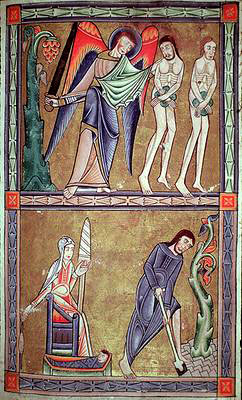
Adam and Eve were expelled from Paradise.
Work is punishment for their sin. |
Dr. Chojnowski’s statement that “to work is essential to what it means to be a human being” is radical and disturbing and could have serious ramifications if it were accepted as fact. If what he says is taken with philosophical rigor, then what are we to call those who are not able to work, such as the disabled, the sick, or children in the womb? Because they are not able to work are they no longer to be seen as human beings? We oppose abortion and euthanasia on the grounds that it is morally wrong to deprive a human being of life.
If being able to work is essential to being a human being, then why oppose the abortion or euthanasia of those who cannot work, since they no longer have that trait essential to being a human? Undoubtedly Dr. Chojnowski, who is well known as a staunch supporter of the right to life, did not realize the serious implications such a statement could have if it was carried to its logical end.
It is quite obvious that work is not an essential trait of human beings. We need only consider that Adam and Eve, who were certainly human beings, were not obliged to work in the Garden of Eden. The obligation of work came into the world with Original Sin when, as a punishment for sin, God decreed that man must labor and toil by the sweat of his brow to bring forth fruits from the earth for his sustenance. God did not say that those who would not or could not work would no longer be humans.
The quote by E. F. Schumacher, which belittles the work primarily of factory workers, which Dr. Chojnowski has reproduced in his statement, has been well refuted by the late Henry Edward Cardinal Manning, in this statement reproduced in the Sunday Times on 10 August 1947:
“It is because he [the worker] brings to his work not only the faculties of his body but those of his mind and spirit that his labor of whatever sort it may be is endowed with a dignity of its own. This has special significance for those who are engaged in dull or monotonous work. If behind the work, there is a real love of God and a desire to serve others by that work, then it doesn’t greatly matter what that work may be. We are all children of God” (5).
Dr. Chojnowski accuses Capitalism of alienating man from his own work so that he no longer considers it his own. But, to regard one’s work as being solely his own is not in keeping with the Catholic principle that encourages man to see his work as essentially God’s and to accomplish it for His sake. It is the intention one brings to his work that makes it ennobling. The most mundane task, when accomplished for the love of God, has great spiritual merit and ennobles, in the eyes of God, the one who does it.
A materialist conception of Civilization
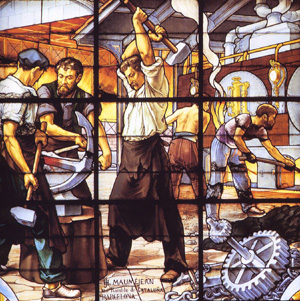
Penty views work as a materialist, ignoring the supernatural aspects of the medieval guilds |
As much of the writing of Arthur Penty revolved around the idea of guilds, perhaps it would be appropriate to discuss briefly the nature of these organizations, as they existed in the Middle Ages. A guild can be defined as “an association for commercial, social, and religious purposes” (6). The Merchant Guilds, as they existed in England, were open to all who were willing and able to pay the fees for admission. Each guild had rules that provided for the conduct of business and that regulated trade for the benefit of the town as well as the guild. The guild masters strictly supervised the quality of goods offered for sale.
When the Merchant Guilds became too large for effectiveness, Craft Guilds were organized for workers in each particular craft, i.e. Clockmaker Guilds, Shoemaker Guilds, and Stonemason Guilds. Each trade was restricted to members of the guild, which in turn regulated the quality of the work and imposed punishments for fraud or adulteration. The guilds, though voluntary lay associations, were firmly grounded on the principles of Catholic justice and morality and were closely tied to the patronage of the Church. Corporate attendance at Mass, processions, distribution of alms, and suffrages for deceased members were common practices of the guilds (7).
In order to make his reader understand why guilds, because they maintained economic justice, became such an important part of medieval society, Penty explains where the economic problem came from in the first place:
“Civilization – that is, the development of the material accessories of life – dates from that simple invention [of currency] … But along with the undoubted advantages which a fixed currency brought with it, there came an evil unknown to primitive society – the economic problem. For the introduction of currency not only undermined the common life of the Mediterranean communities, but it brought into existence the problem of Capitalism” (8).
Penty’s conception of civilization, which is to be found in many of his works, was that of a materialist (9). Civilization might better be defined as a combination of the following: firstly, the moral and religious perfection of a people; secondly, the flourishing of the Arts and culture; and thirdly, the accession of the material goods of life. To limit civilization to the development of the material accessories of life is to ignore the primary role of both Church and State in society.
An obsession with Economics
According to Penty, Capitalism brought in its train the division of society into two distinct and hostile classes. On the one hand were the wealthy landowners and merchants, who with the introduction of currency could now lend money and exact usury. Opposed to them were the peasantry and the debt slaves, many of whom (owing to usury) had lost their ownership of land, which could now be bought and sold as a commodity (10). With currency came into existence a new class of men, who no longer traded solely for the goods they needed for existence, but to gain monetary wealth. They rapidly became experts in finance and had no difficulty in taking advantage of the peasantry.
The “economic problem” caused by unregulated currency, Penty asserts, hastened the dissolution of civilization:
"Unregulated currency gradually disintegrated the civilizations of Greece and Rome (11), and mankind had to wait until the Middle Ages before a solution was forthcoming, when it was provided by the Guilds in the light of the teaching of Christianity, though owing to the fact that the Guilds came into existence as spontaneous and instinctive creations of the people, their significance was entirely overlooked by Medieval thinkers, who, if orthodox, confined their social and political speculations to the range of issues covered by the Civil and Canon Laws, and, if revolutionary, to the issues raised by the Laws of nature, in neither of which situations Guilds found a place.
"This was one of the tragedies of the Middle Ages. For in organizing the Guilds the townsmen of the Middle Ages unconsciously stumbled upon the solution of the problem of currency, but owing to the fact that the minds of thinkers and publicists of the time were engrossed with other things the social potentialities of this great discovery were lost to the world” (12).
An anti-Catholic interpretation of History
Considering the flourishing state of the guilds and how long they lasted, it is hard to believe that they were ignored by the thinkers of the day. Penty finds a further reason for their demise, however, which he attributes to the negligence of the Church:
“But the ultimate reason is to be found in the fact that the impossibility of maintaining, in the long run, a Just Price that was not a Fixed Price was not at that time appreciated by the Church, which appears to have been blind to the need of Guild organization for its maintenance. Churchmen then thought, as so many do today, that the world can be redeemed by moral action alone, never realizing that a high standard of commercial morality can only be maintained if organizations exist to suppress a lower one” (13). [Emphasis mine]
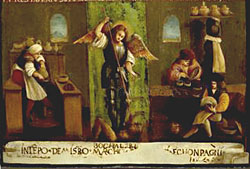
Above, the Potters Guilds of Venice, with St. Michael their patron saint in the center
|
This tendency to lay the ills of society on the shoulders of the Church is common in Penty’s writings. For instance, in another work, when writing about the supposed communist tradition of the early Church (14), as opposed to Her “later” acceptance of the lawfulness of the right of individuals to possess private property, Penty states:
“That confusion should exist in regard to the attitude of Christianity and the medieval world towards property is, I am persuaded, due to the fact that St. Thomas Aquinas is regarded as representative of the medieval point of view. It is insufficiently realized that his teaching about property was of the nature of a compromise intended to reconcile stubborn facts with the communist teaching of the Gospel.
"In the thirteenth century, when he wrote, the Church was already defeated. It had failed in the attempt to suppress the revival of Roman Law, and the practical consequence of the failure was that landlordism was beginning to supplant communal ownership. To attack the institution of property as such was difficult, for the Church itself was implicated. It was immensely rich … In such circumstances, Aquinas apparently thought the only practicable thing to do was to seek to moralize property” (15). [Emphasis mine]
Penty bases his erroneous assumption concerning the teaching of St. Thomas Aquinas upon his own revisionist idea of history. From this, he blames the Church for private property, which he considers an evil. The fact is that the Church has always upheld the right of persons to possess property as being in keeping with the Natural Law.
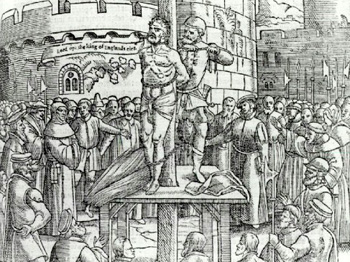
Henry VIII usurped monasteries and confiscated the properties and wealth of the Catholic Guilds |
A study of the History of England quickly reveals the true cause of the destruction of the Catholic guilds. The Anglican rupture with Rome with its relentless persecution of Catholics of all classes sounded the death knell for the Catholic guilds in England. Much of their wealth and property, particularly that which was set aside for spiritual benefactions, was confiscated by Henry VIII to swell the coffers of the State.
Anglicanism as a branch of the Protestant revolt would also favor the growth of the Puritan sect, which looked upon wealth as an infallible sign of predestination. Unrestrained by Catholic principles, which they eschewed, the Puritans embraced the concept of unrestricted Capitalism without concern for the injustices inherent in it. Therefore, it is to Protestantism, rather than to the Church, that the demise of the guilds should be attributed (16).
An incomplete idea of the Kingdom of God
The necessity of a common mind in society if economic justice is to prevail is a mainstay of Penty’s philosophy. He recognized that for the ideas of society’s common mind to be effectual in economics, they must be embodied in an institution. This necessary institution he recognized as being the Catholic Church, but he displayed a woeful ignorance of the Church even as he wrote of her as being chosen by her Divine Founder for this role:
“But if ideas are to exercise a permanent influence on the world of affairs, it is essential for them to be embodied in institutions. Hence, the Church, which Our Lord founded and left behind Him to continue the work He had begun. It was, as we saw, not to be regarded as an end in itself, such as it has come to be, but as an instrument for the establishment of the Kingdom of God. But though Jesus meant that the Church was to be considered as a means rather than an end, He did not mean that a time would ever come when the Kingdom would be established once and forever; because, as a matter of fact, in the sense of finality it never can be established” (17). [Emphasis mine]
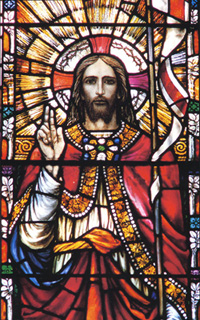
Penty rejects the spiritual aspects of the Reign of Christ to be established on earth |
This is a shocking and blasphemous statement. The Kingdom of Our Lord Jesus Christ can never be established? It has been established on the Cross and lives on in the Church Triumphant, Militant, and Suffering! The Kingdom of Our Lord is an everlasting Kingdom, even as He is a King forever. What can be more final, more permanently established than this eternal Kingdom? Clearly, Penty did not see the Kingdom of God as being a spiritual Kingdom. His idea of God’s Kingdom seems to be an earthly society governed by an institution – the Church - formed by Christ to maintain social justice in the world without reference to the world to come. That Penty was ignorant of the spiritual role of the Church is evident from the following quote:
“From a sociological point of view, the first function of the Church is to maintain in society the acceptance of common standards of thoughts and morals” (18).
This is far from being the first function of the Church in society. As the most elementary catechism teaches, the primary function of the Church is the sanctification of the human race. This she accomplishes, not by “maintaining in society the acceptance of common standards of thoughts and morals”, as Penty would have us believe, but by teaching a divine standard of thoughts and morals, revealed by her Divine Founder, which all must accept and live for salvation. It is only when men embrace and live the Catholic Faith that social justice is possible. To believe otherwise is to pursue a mirage.
In keeping with his idea of the necessity of a common mind in society, Penty recognized that for such a mind to prevail it would become the duty of the institution which embodied it to repress those who refused to accept this mind. This is the reason, he would have us believe, for what he saw as a persecution of heretics by the Church. Rather than acknowledging the role that the State played in suppressing heresy, Penty attributed the use of force to the Church:
“The same is true of the spirit in which heretics were persecuted by the Church. For it was not until the Papacy became a secular power that it began to persecute heretics, while the most active in their persecutions were the great Popes rather than the average ones, and all the great Popes, as Mr. McCabe points out, were canonists rather than theologians” (19).
In the interest of truth, it must be stated firmly that the great Popes, such as Pope St. Pius V (who had been an Inquisitor before ascending the Chair of Peter) were many of them Dominicans and great theologians, as well as canonists. Throughout the History of the Church, until the forceful repression of heresy became a social necessity, heretics were considered by the majority of Catholics as harmless cranks (much as the liberal theologians were before Vatican II) and the Church, considering the death penalty for heretics to be opposed to the spirit of her Founder, was satisfied to condemn their errors and leave them in peace (20). Penty continues his revision of History, however, by stating:
“And this attitude [that the death penalty was contrary to the spirit of the Gospel] continued until the close of the twelfth century when, owing to the spread of the heresy of the Albigensians (which owing to the support of the nobility of Southern France, presented the aspect of a powerful political party in addition to that of an heretical sect), the attitude of the Church changed.
"The Church was terribly afraid of this new spirit, which She considered not only menaced her own existence but the very foundations of society as well, and in the end she shrank from no cruelty that She might be rid of it forever. The persecution of the Albigensians was the great crime of the Middle Ages, but it is interesting to observe that Innocent III, who instigated the persecution, was a canonist rather than a theologian” (21). [Emphasis mine]
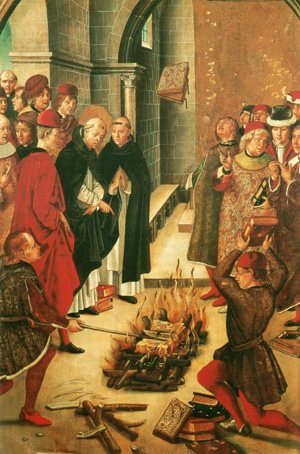
St. Dominic burning heretical works of the Albigensians |
A quick look at History will expose Penty’s error. The Albigensians were followers of the errors of Manes (22) who had settled in the south of France. The relaxed attitude of the Catholic population, due in large part to their co-existence with significant populations of Mohammedans and Jews, had made that area of France a popular refuge for heretics.
The Albigensians believed in two equal and creative spirits, the Spiritus Vivens, God, Who is the Author of all good, and Matter, the author of all evil. This sect taught, among other things, that all life is evil (being the work of the evil spirit) and therefore they rejected marriage as it propagated the “curse” of life, and advocated suicide since it ended the “crime” of living (23). This error was particularly devastating to the uneducated masses, and threatened the life not only of the Church, but of the State as well.
Before calling on secular powers to forcibly repress the Albigensians, the Church went to great lengths to convert them. This was the time of the great St. Dominic, to whom Our Lady gave the devotion of the Rosary as a most powerful aid for the conversion of obstinate heretics. And, indeed, many were converted. However, as the Albigensians were so politically entrenched and destructive a force in the south of France, Pope Innocent III (after the sacrilegious murder of his Papal Legate by a follower of Raymond VI of Toulouse) called for a Crusade against them.
Far from being a “persecution” as Penty asserts, this became a full-scale war with atrocities committed on both sides. The religious motive of the crusaders was sidelined by the political interests of their leader, Simon DeMontfort, and the Crusade became a war of conquest between the Albigensian Count Raymond VI of Toulouse and his armies and Simon DeMontfort and the Christian forces (24).
Thus, we see that the supposed “persecution” of the Albigensians was never anything of the sort. Rather, it was a case of society defending itself against a sect that threatened its very existence. To call such lawful defense a “persecution” and attribute it to the Church is unjust as well as being a distortion of the facts of history.
Penty’s book is a plea to those who see the evils caused by unrestricted Capitalism to return to what he imagines as being the economic system that prevailed in the Middle Ages in order to eliminate the social and economic problems of our own day. Penty has many biased interpretations of the medieval social, political and economic systems that do not correspond to reality. The main point that he did not realize, is that it was the Catholic Faith common to Christendom that gave the Middle Ages their stability.
Distributism, a “Christian” Socialism
Although the idea of avoiding the temptations found in cities by getting “back to the land” can be valid in certain circumstances, many of the ideas of Distributism are not in keeping with Catholic principles. Further, Arthur Penty’s solution of alleviating the distress of the poor by calling for an economic change from Capitalism to Distributism was, and is, doomed to failure.
Although distributists today attempt to whitewash the Socialism to be found in their ideological guru, the fact remains that the theory of Distributism is nothing but “Christian” Socialism, and as such is an enemy of the Catholic Faith. It is futile to think that a wholesale change in our economic system, of itself, can solve our social and economic woes. Before nations can amend, the hearts of their peoples must amend. Likewise, before Catholic social principles (25) can be embodied in the laws of nations, the Faith must be accepted and lived by their citizens. This is a fact that Arthur Penty never accepted.
Given the many ideas this book contains that are clearly at variance with authentic Catholic teaching, it seems quite obvious that this is not a book that should be recommended in Catholic circles. It is a great disappointment to find works of this sort published by a purportedly Catholic press and recommended by those who call themselves traditionalist Catholics.
If those who favor Distributism wish to publish and promote works on the theory, perhaps they should confine themselves to works that are free of anti-Catholic bias and entirely orthodox in nature. By doing so, they would eliminate much of the controversy surrounding the topic.
1. There may be some who will object to my use of the term "political" in my definition of Distributism. As the distributists advocate the revival of guilds with governing powers, however, I make no apologies for my use of the term.
2. We can cite examples of failed communes in America such as Brook Farm, which was founded in Massachusetts by George Ripley in 1841, and the Oneida Community, founded in New York State by John Humphrey Noyes in 1844. It may be argued that these two communities failed because they were not founded on the principles of Catholicism, but it must be remembered that Arthur Penty was also a non-Catholic and advocated a “common mind” in society that should be based on “common standards of thought and morals” based on Christianity. He does not say that these standards of thoughts and morals should be those of Catholicism (Penty, The Gauntlet Norfolk, VA: IHS Press, 2003, p. 85).
3. Ibid., page 10.
4. Ibid., page 13.
5. Quoted in the essay "The Truth About Work" by George Maxwell, published in Distributist Perspectives, vol. 1 (Norfolk, VA: IHS Press, 2004), p. 44.
6. Donald Attwater, A Catholic Dictionary (Rockford, IL: TAN), 3rd ed., p. 209.
7. For a more complete description of the guilds as they existed in England, Wales, and Ireland, see the excellent entry by Donald Attwater, op. cit., p. 209.
8. A. J. Penty, The Gauntlet, p. 27
9. I use the word "materialist" in its modified sense to denote one who has an excessive concern for material development and comfort. See D. Attwater, A Catholic Dictionary, p. 314.
10. A. J. Penty, The Gauntlet, p.27.
11. The author makes no mention of the rampant immorality, including sodomy, which played a far greater role in the disintegration of the civilizations of Greece and Rome than unregulated currency of itself could ever have accomplished. By attacking the family, the basic cell of society, these vices wreaked havoc with pagan civilization.
In his excellent series of books covering the Apostolic age of the Church, Abbé Constant Fouard, citing Plato, Cicero, Seneca, and other Classical writers, writes of these excesses: “Of all excesses, the one that proved most fatal to the Roman family was the ignominious scourge that brought destruction upon Sodom. … Rome … kept companies of Gitons [N.B. A giton is a homosexual prostitute]. The noblest minds – Cicero, Brutus, Caesar – were stained by these hideous passions. Refined and splendid poets, like Horace, Virgil, Tibullus and Catullus, boast of their monstrous self-indulgence.” St. Peter and the First Years of Christianity (New York: Longmans, Green, and Co., 1920), p. 295.
12. A. J. Penty, The Gauntlet, page 28.
13. Ibid., p. 30.
14. Citing references to the Acts of the Apostles, Penty states: “The early Church continued the communistic principles of the Apostles.” Arthur J. Penty, A Guildsman’s Interpretation of History (London: George Allen & Unwin LTD, 1920). The texts cited by Penty refer only to the Church in Jerusalem. Outside of that Church, the practice of sharing all things in common was not universally followed. See Fouard, St. Paul and His Missions (Longmans, Green, and Co., 1899), pp. 258, 259.
15. A. J. Penty, A Guildsman’s Interpretation of History, p. 37.
16. For an explanation of the Anglican schism and the problems it caused, see Nicholas Sander, The Rise and Growth of the Anglican Schism, Rockford, IL : TAN Books, 1988.
17. A. J. Penty, The Gauntlet, p. 80.
18. Ibid., p. 80.
19. Ibid., p. 83.
20. See William Thomas Walsh, Characters of the Inquisition (Rockford, IL: Tan Books, 1987), p.24.
21. A. J. Penty, The Gauntlet, p. 84.
22. Manes was a Persian living during the 3rd century who taught a form of metaphysical and religious dualism which came to be known as Manichaeism.
23. W. T. Walsh, Characters of the Inquisition, p. 26.
24. Fr. John Laux, Church History (Rockford, IL : TAN Books, 1989), p. 353.
25. To gain knowledge of the Church’s authentic social teaching, see the books written by Fr. Stephen DeLallo: Catholic Action For Christ Our King (Post Falls, ID: Lepanto Press), and The Sword of Christendom (Kansas City, MO: Angelus Press, 1994).

Posted on May 14, 2007
The pleasure TIA has to publish collaborations of our guest columnists
does not imply that it endorses all the opinions expressed in their articles.
Return to TOP

Related Topics of Interest
 Distributist Manifesto: Strongly Spiced with Communism Distributist Manifesto: Strongly Spiced with Communism
 Socialism and Distributism in Catholic Clothing Socialism and Distributism in Catholic Clothing
 Eric Gill: the Pedophile Founder of Distributism Eric Gill: the Pedophile Founder of Distributism
 Other Moral Pearls of Eric Gill Other Moral Pearls of Eric Gill
 A Torrent of Pros and Cons on Eric Gill, a Founder of Distributism A Torrent of Pros and Cons on Eric Gill, a Founder of Distributism
 Eric Gill, a Precursor of Vatican II Eric Gill, a Precursor of Vatican II

Related Works of Interest
|
Book Reviews | Home | Books | CDs | Search | Contact Us | Donate

© 2002-
Tradition in Action, Inc. All Rights Reserved
|
 |
|